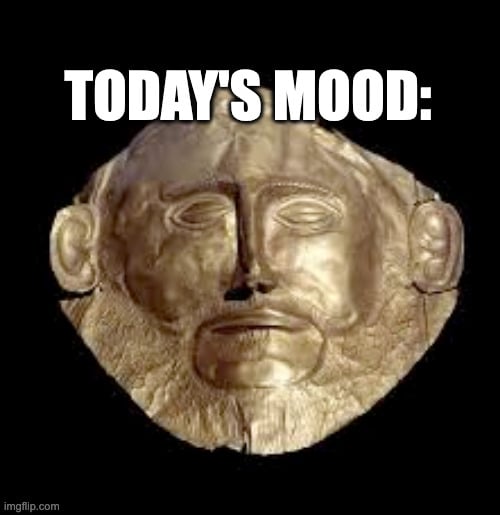They just had sex, too.
- 1 Post
- 27 Comments
The belt and belt loops go all along the top row. If there’s only one row, the matrix can only wear a short-shorts version. There’s a crotch in each space between columns, and a leg on every column of length greater than 1.
Sparse matrices have their own special pants that are more efficient, of course.

 9·7 days ago
9·7 days agoGeorge HW Bush was the last one to leave office while the economy was doing well. It was going fine at the end of George W Bush’s first term, then the 2007 housing crash brought it down. Trump’s first term ended with the covid lockdowns severely harming the state of things. So… 3 Republican presidencies ago, but that’s a lot of years.

 26·11 days ago
26·11 days agoTrump was pretty ineffective in his first term, largely because he did a terrible job of supporting people who really agreed with his agenda, and an even worse job of removing people from influential positions who didn’t.
He said during his campaign that he knew much better who to trust, but now he’s got Elon Musk and RFK Jr. prominently featured. I don’t think he has learned anything, and I think he will be just as ineffective this time.
It’s possible that some of the Republicans in Congress will support more of his agenda, but even there if they have to overcome the filibuster, I don’t think mass deportation, a federal abortion ban, or most of the rest of the potential worst of it is in the cards.
This makes for way better TV than if the camera simply worked. It’s a mistake that a human would probably never make, and definitely not persist in making.
As long as you can maintain a steady stream of ejaculate, it’ll feel the same for her.

 3·29 days ago
3·29 days agoA real journalist would’ve posted spectrophotometry results. Those are generally quite cheap and fast.

 3·29 days ago
3·29 days agoI have made fun of another man for peeing sitting down, but in a manner comparable to making fun of an ugly outfit. The very hidden secret is I sit to pee sometimes too, and I have ugly clothes that I wear sometimes. To answer the other questions:
If I’m already sitting, I’d pee sitting, 100% of the time.
Yes, and that’s one reason I would sit to pee.
Not spotless, but it seems normal to me. If there’s pee visible anywhere, I wipe it with paper. My wife mops the floor more often than I do.
I don’t have a ready answer for this.

 1·2 months ago
1·2 months agoThat must be a giant upgrade, on account of the many ways a Boeing could be coming down.

 17·2 months ago
17·2 months agoIf you’re in the US, run for Congress, win, reform the medicaid backed doctor residency program, with the aim of opening it up so many more people can become doctors. Then watch as the new supply brings down salaries, and eventually gets lazy/ineffective doctors fired. Revenge is a dish best served nation wide, as they say.
The sun itself is a medium that can propogate sound waves. Someone standing on the Moon could equally well make the case that there is no medium to propagate pressure waves from the Earth, so the Earth must not make a sound.

 1·3 months ago
1·3 months ago“Bigger” is easy, because there are obvious ways to measure the size of a government, like the revenue the government gets, the amount of government spending, the number of people working directly for the government, the number of people currently imprisoned, or who have been imprisoned at some time in their life. There’s also slightly more abstract things like the amount of time people spending doing paperwork for the purposes of the government, and the total volume (pages might be a reasonable measure) of government laws, and regulations.
As for controlling more of our lives, I think it’s significant that many of the most influential regulations are local. Cities design with building codes with the idea of servicing car traffic, emergency vehicles, and parking needs. This prioritizes cars over other forms of transit by government mandate, and puts a pretty steep upper limit on how walking friendly (or bicycle, or mass transit) city areas are allowed to be. In most places, you need exceptions to the rules to have areas without roads running everywhere.
A similar thing happens in food regulations. Many places around the world have small food vendors that sell a single (or a few) food items from a stall on the street side. The US has strict food regulations that require sinks, refrigeration, and other items that don’t fit in that kind of environment. Most US cities also control the number of street side vendors that are allowed to exist. If you watch “street food” videos, that doesn’t exist in the US because of our regulations.
Regulations add to the cost and complexity of housing. My great grandfather built a house. I read the requirements to do that now, and gave up. There are hundreds of pages of regulations and requirements, inspection schedules, and licensing requirements that must be followed. Some of those regulations aren’t even free to access.
On the other hand, these requirements placed uniformly on many industries have some benefits. When you buy a house, you can expect it to be suitable in a huge number of circumstances. Self built, self designed houses sometimes have major design flaws, and sometimes collapse or burn down or flood for surprising reasons that could have been foreseen by experts.
It’s very likely that more things we do are regulated, and those regulated activities are more tightly controlled than they were in the past. A part of that is that politicians are systemically more willing to make additional regulations than they are to remove existing regulations, even if some of those regulations are known not to work.

 3·4 months ago
3·4 months agoThere’s a lot of space between a food that’s dangerous to touch, and foods that require effort to eat safely.
A warning that the coffee is hot isn’t enough to meaningfully disclose that the coffee will do severe damage if you touch it, while a disclaimer that boneless wings may contain bone fragments does enough to disclose that there may be bone fragments. Lots of other foods have bones and bone fragments, and are eaten in near perfect safety very frequently. There are no other foods routinely served so hot that they will cause burns, specifically because they are always unsafe.

 3·4 months ago
3·4 months agoI think this is a good decision, and you always have to chew food for it to be safe, boneless or otherwise. There is no processing method (human or machine) that can reliably remove every bone or bone fragment, so the practical effect of the opposite outcome will be restaurants putting disclaimers that boneless products might contain bone.
It will be no safer for consumers, and basically no different for restaurants, except this specific restaurant will be badly hurt by being the first one to have a customer incur significant medical expenses from this problem. It will just be the raw/undercooked warning part 2, and we will slowly work our way to a page of disclaimers in every menu.

 2·4 months ago
2·4 months agoPronounced “Yes, Mate”. It was named by Australians.
I don’t know if it’s just me, but I can’t even tell how many limbs the creatures in the left image have, even after zooming in.
 4·4 months ago
4·4 months agoThe total land area of the US is 3,531,905 square miles. One 50th of that is 70,638.1 square miles. According to a highly reputable wikipedia article I found, North Dakota has the land area closest to that, at 69,001 square miles.
If you use the exclusive economic zone, and compare one 50th of that to the total area of the states, Minnesota is closest, instead.

 2·4 months ago
2·4 months agoI recognize that this is pretty idealized, and that most women will inevitably fall short in some respects. That doesn’t mean you shouldn’t be able to show the results of putting in some effort, like having 7 breasts, even if you can’t achieve the ideal 11 breasted body.

 2·5 months ago
2·5 months agoThey explain why they can’t put packages in your mailbox, and suggest that if you designate a location with a sign, that’s the clearest way to get your package where you want.
They don’t see delivery instructions until they arrive at your house, so “call ahead” type instructions are unworkable for the drivers. They also caution that the delivery vehicle might not be a branded vehicle, and that items may be visible when delivered, so if you want to surprise someone, make sure they aren’t at home, I guess for the whole day of the delivery.




It, uhh… It looks like your double peen is made of plastic. Are you sure this is something to brag about?